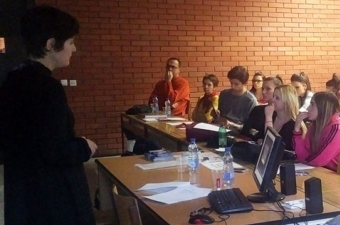As part of the Tribunal’s Youth Outreach Project, Tea Polešćuk, Legal Advisor in the Office of the Prosecutor, gave two lectures on the topic “ICTY Achievements and lessons learnt in adjudicating war time sexual violence” to 70 students at two universities in Serbia. The first lecture took place on 15 December at the Law Faculty in Niš, and the next day, on 16 December, Ms Polešćuk spoke to journalism students in Novi Sad.
Ms Polešćuk spoke to the students about the wider context of sexual violence throughout the history of warfare and its place in the jurisprudence of courts before the establishment of the ICTY. Furthermore, she explained the definition of sexual violence in wartime, how the definition has evolved over time, as well as relevant provisions of the ICTY Statute and Rules of Procedure and Evidence. Ms Polešćuk also mentioned the judgements and decisions the ICTY has rendered in relation to this issue. She went on to explain in detail the relevant ICTY cases, including the Mucić et al., Kunarac et al., Šainović et al., and Đorđević cases and the findings the Tribunal has made in relation to each of them.
Students from both universities also learned that the Tribunal was the first international court to take ground-breaking steps in prosecuting wartime sexual violence. Together with its sister tribunal for Rwanda, the Tribunal was among the first courts of its kind to explicitly charge accused with wartime sexual violence and to define gender crimes, such as rape and sexual enslavement, under customary international law.
Attending students showed great interest in the topic and were surprised to learn about the extent of sexual violence crimes committed during the armed conflict in the former Yugoslavia.
After the lectures, teaching staff and students at both universities commended the Outreach Programme’s initiative in organising the lectures. Staff and students also expressed interest in continuing cooperation with the Outreach Programme over the course of the coming academic year.


